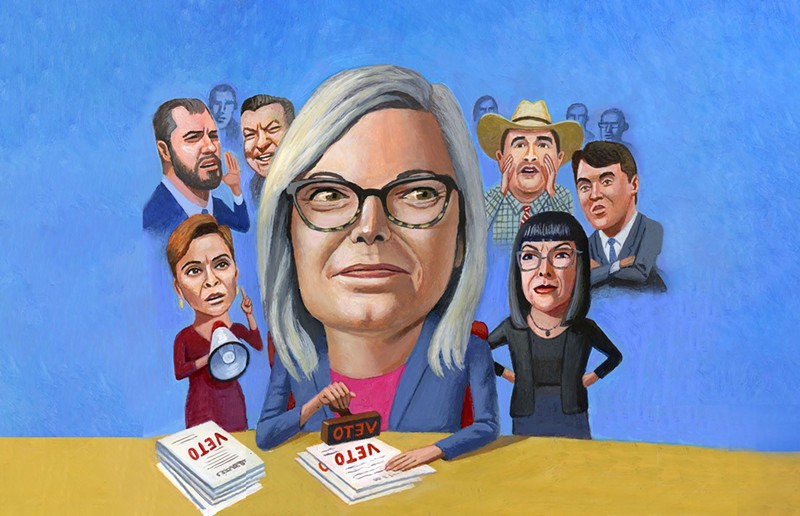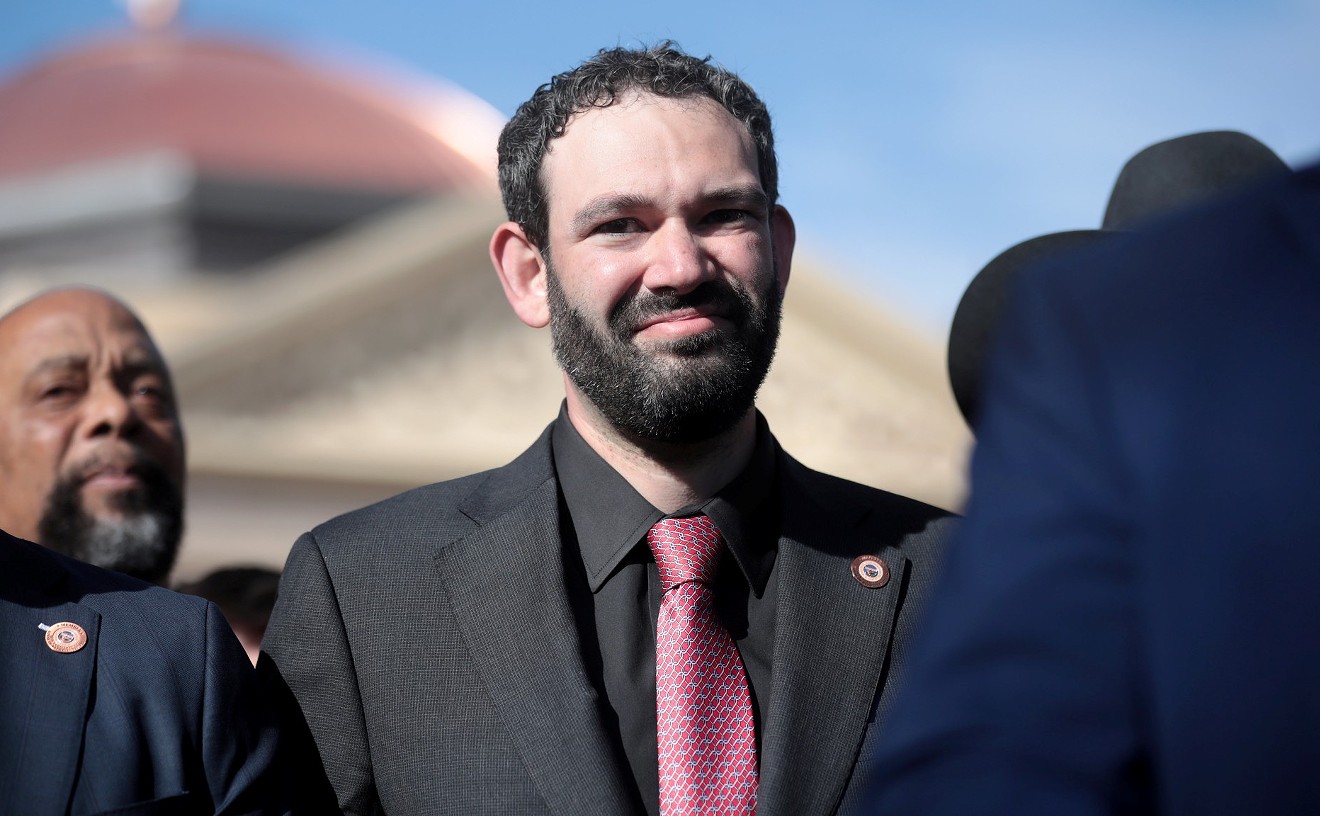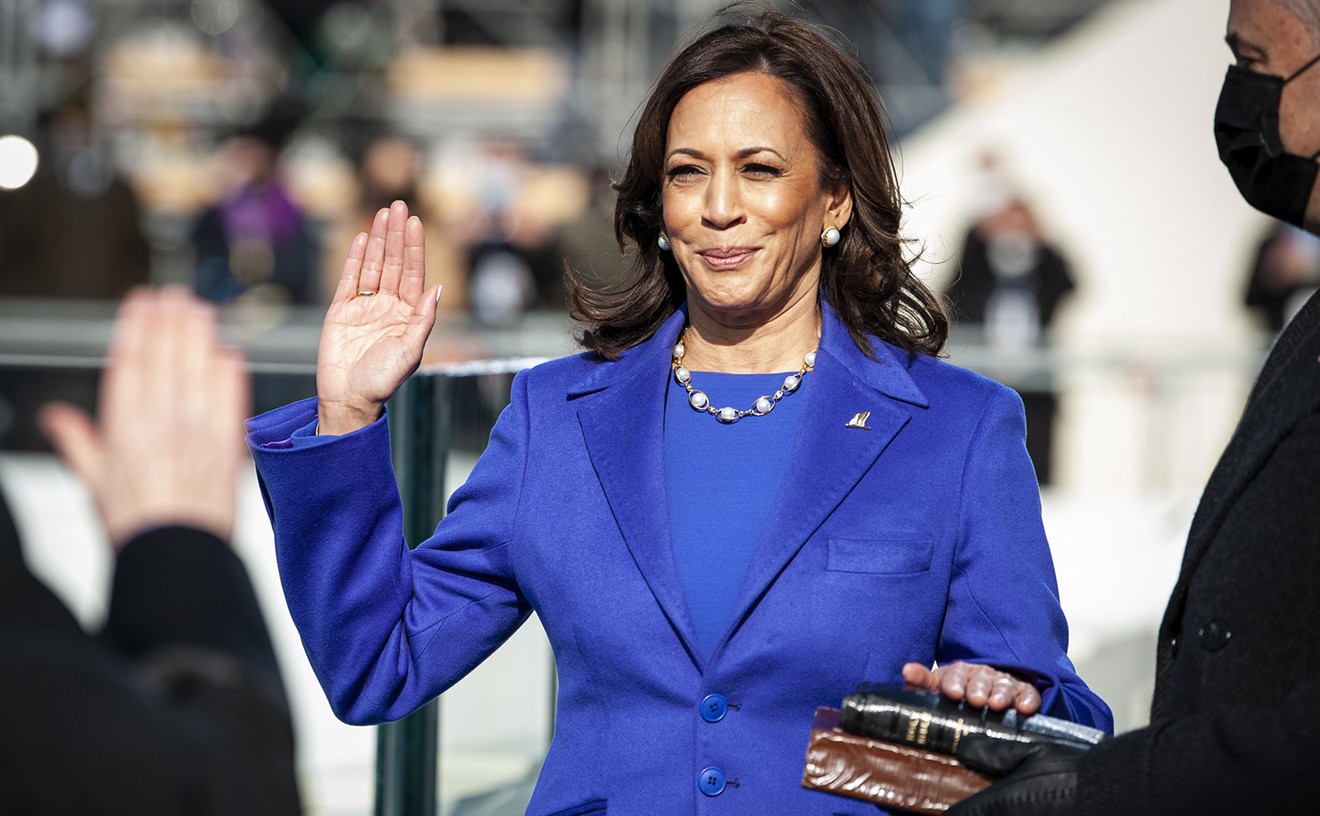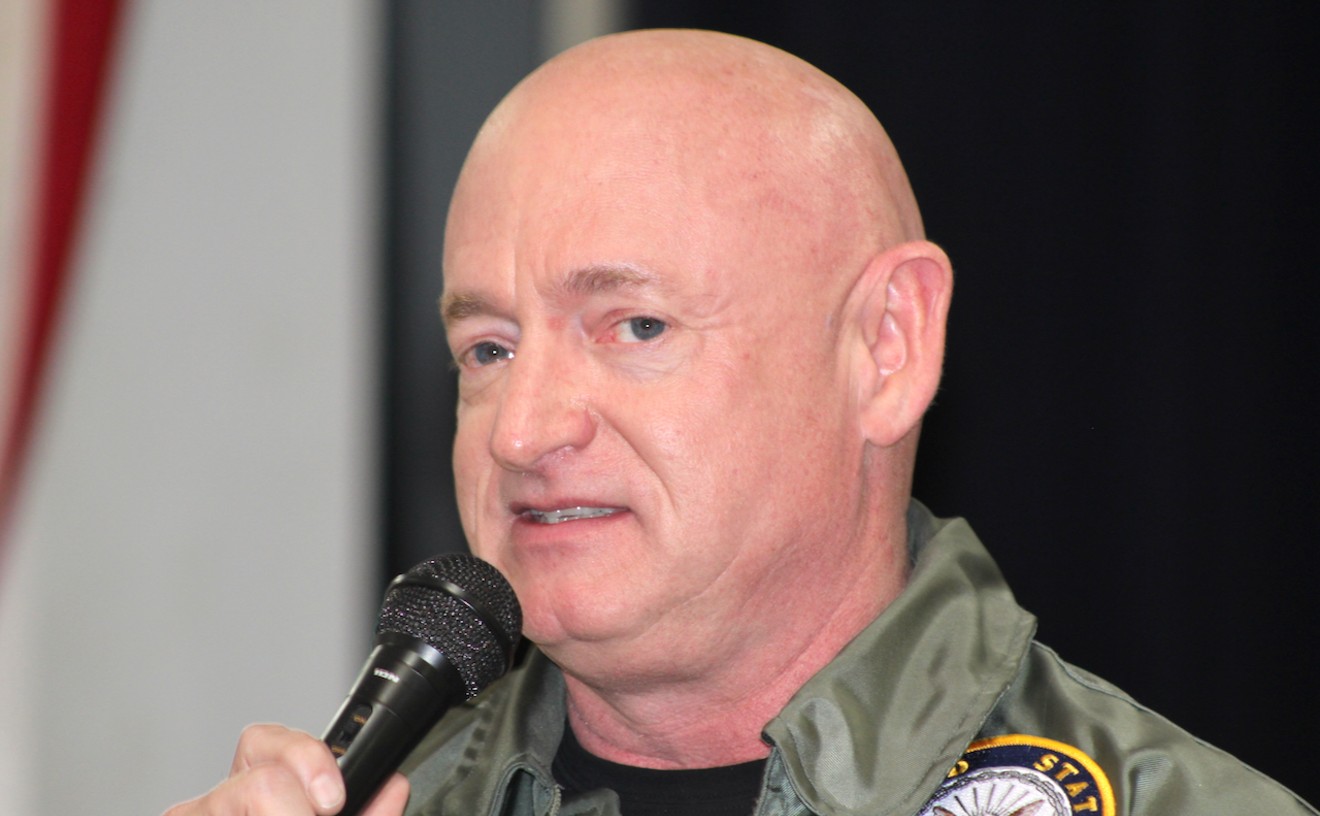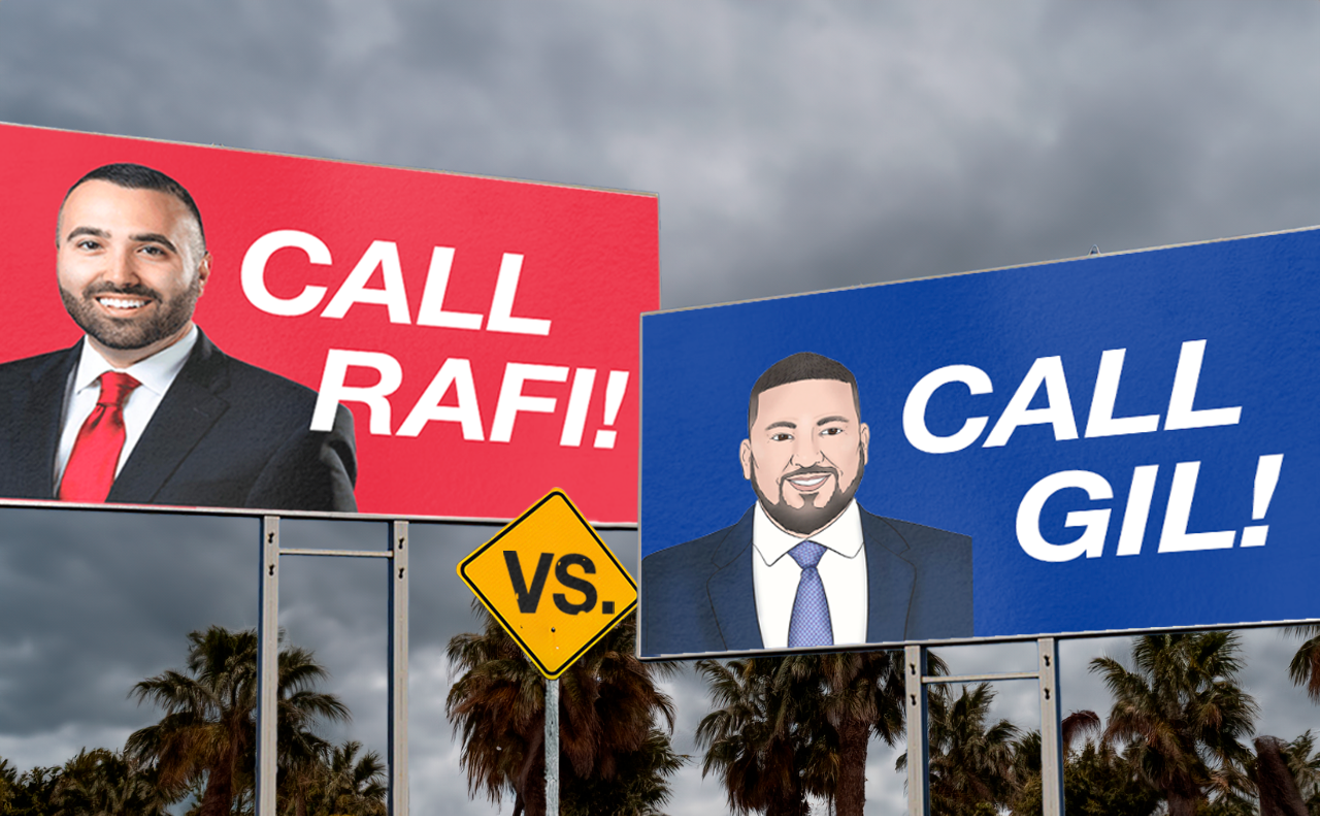***
The Veto Queen is back.
After a record-shattering 143 vetoes in 2023, Gov. Katie Hobbs dusted off her veto stamp and rejected 73 bills in 2024. That brings her two-year total to 216, crushing the record set by fellow Democratic Gov. Janet Napolitano, who vetoed 181 bills from 2003-09.
Hobbs' 2024 veto-rama included a whopping 52 vetoes in April alone.
Here's a rundown of every bill Hobbs shot down in the 2024 legislative session, which ended in June.
March
Senate Bill 1231: Vetoed on March 4. The measure allowed local police to arrest non-U.S. citizens suspected of illegally crossing the border between Arizona and Mexico, even though border enforcement is a federal issue. “This bill presents significant constitutional concerns and would be certain to mire the State in costly and protracted legislation,” Hobbs wrote. The measure has since been rolled into the "Secure the Border Act" that Republican lawmakers referred to the November ballot.House Bill 2570: Vetoed on March 18. The measure, dubbed the “Arizona Starter Home Act," received bipartisan support in the legislature. The bill barred cities and towns with more than 70,000 residents from regulating lot sizes for single-family homes and curtailed the influence of homeowners associations over design choices. "This is unprecedented legislation that would put Arizonans at the center of a housing reform experiment with unclear outcomes," Hobbs said in her veto letter. In May, Hobbs signed two other bills meant to increase the housing supply.
HB 2100: Vetoed on March 29. The measure required license-issuing state agencies to include on their websites a list of items needed for an application to be deemed administratively complete. The bill prohibited agencies from making a final decision on an application based on documents not included in the list unless the applicant had a chance to challenge the document before submitting an application. Hobbs called the requirements "onerous" and said they would increase wait times and costs. "Our responsibility is to make government more efficient, not less," she wrote.
April
HB 2013: Vetoed on April 2. This bill would have allowed nonprofits to establish water improvement programs that would provide financial assistance to residential property owners to improve drinking water wells or establish water delivery systems. Currently, only county boards of supervisors hold such power. Hobbs wrote that the measure "does nothing to move the needle on groundwater management or to provide the reforms that are desperately needed by rural communities who are facing depletion of their aquifers."HB 2019: Vetoed on April 2. This bill would have allowed the public to inspect and challenge the models used by the Department of Water Resources to determine if proposed developments have at least a 100-year supply of water as required by state law. Hobbs noted the department's models already are on its website and wrote that HB 2019 would "create unnecessary bureaucratic processes."
HB 2027: Vetoed on April 2. This bill outlined exemptions to Department of Water Resources requirements for developments in future Active Management Areas — or areas of the state where groundwater depletion has occurred. Currently, it would apply only to Douglas. Hobbs wrote that the bill was redundant and "unnecessarily codifies" a process the department already follows.
HB 2031: Vetoed on April 2. Currently, county boards of supervisors can ask voters to increase the size of the board from three to five members when the county's population passes 150,000. This bill would have lowered the threshold to 125,000. Hobbs wrote that the bill "is unnecessary."
HB 2123: Vetoed on April 2. This bill would have prevented state and local governments from requiring the use of water-measuring devices to be used on wells in certain areas outside of Active Management Areas. Hobbs wrote that the measure "sends the message that Arizona is uninterested in sound management of our precious groundwater supplies."
HB 2183: Vetoed on April 2. This bill would have required parents be given access to any of their children's electronic medical records, including for treatments such as obtaining contraception that do not require parental consent. Hobbs wrote that the measure "could put the health and safety of vulnerable Arizonans at risk."
HB 2184: Vetoed on April 2. This bill would have altered last year's budget in relation to a desalination pilot program. Hobbs wrote it should be considered during 2024 budget discussions, not separately.
HB 2271: Vetoed on April 2. This bill would have created a special license plate to benefit religious educational institutions outside Arizona. "Establishing special plates that benefit out of state private education institutions using public resources is not the best use of Arizona taxpayers' money," Hobbs wrote.
HB 2309: Vetoed on April 2. This bill would have cut the term of the state's tax abatement program from eight to four years for developers leasing government land. Hobbs wrote that it "would have harmful consequences for economic development efforts."
HB 2375: Vetoed on April 2. This bill would have prevented local governments from establishing a guaranteed income program. Hobbs wrote that the bill's "broad language" could "threaten programs Arizonans rely on, such as housing, food and emergency need programs."
HB 2502: Vetoed on April 2. This bill would have mandated that "able-bodied" adults younger than age 60 participate in employment training as a condition of receiving food assistance from the state. Hobbs wrote that she had "significant concerns" about how the bill would "affect the economic well-being of Arizonans" who receive those benefits.
HB 2503: Vetoed on April 2. This bill would have prohibited the Department of Economic Security from applying for or granting any work requirement waiver for able-bodied adults without dependents in the state's food assistance program, unless the waiver is required by federal law. Hobbs wrote that the bill would "inhibit our state's ability to respond" in difficult times and "place additional strain on food banks."
HB 2629: Vetoed on April 2. This bill would have declared Nov. 7 as "Victims of Communism Day" while requiring public high schools to teach the history of communist regimes around the world. Hobbs called the bill "too prescriptive in dictating instructional requirements" but said she will proclaim Nov. 7, 2024, as "Victims of Communism Day."
SB 1073: Vetoed on April 2. This bill would have made it a felony for protesters to block a highway, bridge or tunnel for more than 15 minutes after being asked to leave. Hobbs wrote that "it is critical we approach these matters with precision to avoid infringing on Arizonans' rights."
SB 1343: Vetoed on April 2. This bill would have mandated that occupational licensing requirements by state agencies expire after five years unless the agencies publish a report comparing the requirements with those in neighboring states. Hobbs wrote that agencies' rule-making process is already "rigorous, transparent and essential to allowing the State government to function and serve Arizonans."
HB 2157: Vetoed on April 8. This bill would have prohibited a court from ending a defendant's probation because he or she was deported. Hobbs wrote that the law already states that "a person's probation continues upon returning to the country."
HB 2586: Vetoed on April 8. This bill, opposed by the American Civil Liberties Union and most Democrats, would have required websites to perform age verification for content deemed "harmful" for minors and would have allowed those sites to be held civilly liable for violating it. Hobbs wrote that a solution to protecting children online "should be bipartisan and work within the bounds of the First Amendment."
HB 2788: Vetoed on April 8. This bill would have prevented using public money to adopt sustainable development measures also adopted by the United Nations. Examples of UN aims include "end poverty," "achieve gender equality" and "take urgent action to combat climate change." Republican state Rep. Rachel Jones said those goals were part of the UN's "globalist agenda." Hobbs, however, said they were "goals every Arizonan can support."
HB 2793: Vetoed on April 8. This bill would have mandated that school boards create policies limiting students' internet access and phone usage at school. Hobbs wrote that it would create "an unnecessary mandate for an issue schools are already addressing."
HB 2843: Vetoed on April 8. This bill would have allowed property owners to use force against trespassers anywhere on their property, not just near their houses and yards. Essentially, it would have allowed ranchers to kill any migrants who step foot on their land. Hobbs wrote that the bill "values property over human life and incentivizes vigilantism" and that it was "another example of extremists in the Arizona legislature."
HB 2125: Vetoed on April 9. This bill would have boosted the number of signatures required to annex an unincorporated territory into Maricopa County to 60% of property owners in the area. The current requirement is 50%. Hobbs wrote that the bill "would favor the voices of some Arizonans over others."
HB 2393: Vetoed on April 10. This bill would require that political parties that do not choose a nominee by presidential preference election — and instead choose by a vote open to all party members — provide a method for voting for persons with disabilities and overseas military members. The measure passed with only Republican votes, and Hobbs wrote that if Arizona "were to change the manner in which political parties hold their own elections, it would be important to reflect bipartisan agreement."
HB 2404: Vetoed on April 10. This bill would have prohibited county recorders from issuing voter registration cards to people with out-of-state mailing addresses, except in certain circumstances. Hobbs wrote that state law already "outline(s) the process when a voter provides a new residential address that is located outside the state."
HB 2504: Vetoed on April 10. This bill would have outlawed performing genetic sequencing on devices or software from companies based in or controlled by a "foreign adversary," with China named specifically. The bill also would have allowed insurers to limit coverage for genetic sequencing performed by such a company and for organ transplants performed in China or Hong Kong. Hobbs wrote that she understood "the intentions for this bill" but said "it includes overbroad provisions" that would make it difficult for health care providers to comply.
HB 2612: Vetoed on April 10. This bill would have prohibited someone from holding elected public office if convicted of ballot abuse offenses such as knowingly collecting early ballots. Hobbs called the bill "unnecessary."
HB 2658: Vetoed on April 10. This bill would have prevented pedestrians from soliciting on traffic islands, highway entrance and exit ramps, and intersections without sidewalks. Hobbs wrote that "it's critical that we approach this matters with precision to avoid infringing upon Arizonans' freedoms."
SB 1061: Vetoed on April 16. This bill would have slightly pushed back the date by when the Committee of Reference would be required to hold a public hearing on whether state agencies should be "sunset" or wound down. Hobbs wrote that legislators can already hold such hearings between legislative sessions.
SB 1097: Vetoed on April 16. This bill would have made school district governing board elections partisan contests beginning in 2025. Hobbs wrote that "partisan politics do not belong in Arizona's schools."
SB 1146: Vetoed on April 16. This bill stated that the state Department of Agriculture and the State Veterinarian would not be authorized to require that aquaculture, poultry or livestock receive an mRNA vaccine that has not received full federal approval. Additionally, it would have allowed products derived from such vaccine-free animals to carry an "mRNA free" label. Hobbs wrote the bill would "pose a risk to the health and safety of Arizonans" and "the vitality of cattle ranchers and farmers."
SB 1151: Vetoed on April 16. This bill would have allowed teachers to read or post the Ten Commandments in public schools. Hobbs wrote that she had "serious concerns about the constitutionality of this legislation."
SB 1153: Vetoed on April 16. This bill would subject new state agency rules to legislative approval if they increase regulatory costs by more than $500,000 over five years. Hobbs wrote that the bill would "create an unnecessary burden on state agencies." State Republicans referred a similar measure to the November ballot.
SB 1189: Vetoed on April 16. This bill would have prevented municipalities from prohibiting gun shows. "I vetoed this exact legislation last session," Hobbs wrote, noting that it restricts the ability of local governments "to make decisions about how to keep their communities safe."
SB 1289: Vetoed on April 16. This bill would have required the governor and the Department of Water Resources to send reports on Active Management Areas to the state legislature at least 30 days before publishing them. Hobbs wrote the bill would "drown the Department in paperwork."
SB 1299: Vetoed on April 16. This bill would have required that a registered engineer determine whether a right turn on a red light is unsafe at a specific intersection before a government entity could prohibit such turns. Hobbs wrote that the Department of Transportation and local jurisdictions already follow traffic engineering guidelines.
SB 1330: Vetoed on April 16. This bill would have changed the term "drop box" to "ballot box" and "container" at on-site ballot tabulation sites. Hobbs called the law "unnecessary."
SB 1366: Vetoed on April 16. This bill would have allowed blockchain technology products to apply to participate in the Arizona Regulatory Sandbox program, which allows limited access to Arizona markets to test innovative financial products and services. Hobbs wrote that the bill was "too broad" and would undermine the program's purpose.
SB 1412: Vetoed on April 16. This bill would have altered sentencing for shoplifting, which can be elevated to a class 4 felony if a person has a shoplifting, burglary, robbery or theft conviction within the past five years. SB 1412 would have excluded time spent in jail or prison as part of that five-year calculation. Hobbs wrote that she'd rather wait for recommendations from the newly created Organized Retail Theft Task Force.
SB 1509: Vetoed on April 16. This bill would have required health care providers to obtain informed consent for surgical procedures on forms that include signatures from the provider, patient and a witness. Hobbs wrote that doing so is "already standard practice."
SB 1628: Vetoed on April 16. This bill would have replaced every reference to "gender" in state law with "sex," which Hobbs and others viewed as an attack on transgender people. "As I have said time and time again," Hobbs wrote, "I will not sign legislation that attacks Arizonans."
HB 2002: Vetoed on April 23. The bill would have changed the definition of "transmission line" to exclude substations or switchyards, loosening regulations for utility companies looking to construct one. "There are more targeted approaches to adjust the Power Plant and Line Sitting Committee permitting process," Hobbs wrote in her veto letter.
HB 2328: Vetoed on April 23. This bill would have let mobile food vendors operate on private property with certain restrictions. Hobbs wrote the bill was crafted "without input from key community stakeholders and fails to strike the correct balance between deregulation and safety requirements."
HB 2491: Vetoed on April 23. This bill would have allowed any person to file complaints to the Administrative Rules Oversight Committee about any policy inconsistent with "legislative intent" or beyond the agency's statutory power. It also would have allowed legislative leadership to add members to the Governor's Regulatory Review Council. Hobbs simply wrote that the bill "is unnecessary."
HB 2581: Vetoed on April 23. This bill would have defined an Arizona resident as someone who has lived in the state for at least 181 days for the purposes of voter and vehicle registration. For voter registration, state law currently defines an Arizona resident as someone who has lived in the state for 29 days prior to an election. Hobbs wrote that the bill would "create additional, unnecessary barriers for individuals registering to vote."
HB 2646: Vetoed on April 23. This law would have barred public service corporations and public power entities from shutting down a facility within five years of notifying the Arizona Power Authority and certain high-ranking members of the state Legislature. Hobbs wrote that those corporations and entities already "file comprehensive resource plans" that include "timelines for existing power plant closures."
SB 1060: Vetoed on April 23. This bill would have allowed candidates for federal office to choose election observers at polling centers. Hobbs wrote that state law already "provides for the designation of observers."
SB 1129: Vetoed on April 23. This bill would have allowed a property owner to ask law enforcement to immediately remove someone unlawfully occupying their residence. Hobbs wrote the bill failed "to leverage existing legal mechanisms," respect due process rights and minimize unintended consequences "such as for victims of domestic violence."
SB 1182: Vetoed on April 23. This bill would have given transgender public school students access to single-use or faculty showers while also allowing someone to bring a cause of action against the school if a transgender student used a shower that didn't correspond to the student's biological sex. "As I have said time and time again," Hobbs wrote, "I will not sign legislation that attacks Arizonans."
SB 1340: Vetoed on April 23. This bill would have prohibited publicly managed funds from doing business with banks located in countries designated as foreign adversaries. Hobbs wrote that the bill would be "detrimental to the economic growth of Arizona."
SB 1414: Vetoed on April 23. This bill would have categorized anyone convicted of three or more violations of organized retail theft as a level two repeat offender, which increases the prison time associated with an offense. Hobbs wrote that she wanted to wait for recommendations from the Organized Retail Theft Task Force.
HB 2063: Vetoed on April 30. This bill would have required the Department of Water Resources to give certificates of water rights to users of smaller "exempt" wells that pump no more than 35 gallons per minute. "This measure serves no water management purpose," Hobbs wrote, "and would divert meaningful functions of this critical agency to unnecessary paperwork."
HB 2124: Vetoed on April 30. This bill would have prevented the state attorney general from bringing a public nuisance action in Superior Court against any agricultural operation and would have awarded those operations with costs and attorneys fees if a judge determined the action was filed to reduce water use. Hobbs wrote that "water policy needs to be addressed in a holistic manner."
HB 2591: Vetoed on April 30. This bill would have barred public power utilities and public service corporations from entering into contracts with companies that use forced or child labor. "Current Federal law addresses this prohibition," Hobbs wrote.
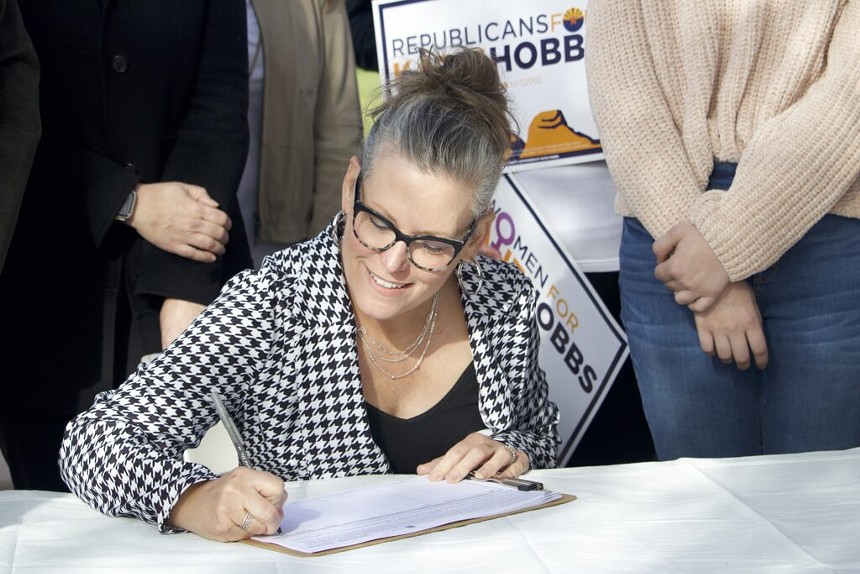
Gov. Katie Hobbs vetoed 73 pieces of legislation in 2024, including several anti-LGBTQ+ bills.
Gloria Rebecca Gomez | Arizona Mirror
May
SB 1473: Vetoed on May 6. This bill would have imposed a financial penalty on state agencies that don't file federal fund expenditure reports on time. Hobbs wrote that reporting delays "were inherited from the previous administration" and that agencies "should not be punished for leveraging a once in a generation influx of federal funding."HB 2095: Vetoed on May 17. This bill would have allowed students placed in foster care before graduating high school or earning a GED to apply for specific educational scholarships and tuition grants. Hobbs wrote that the bill would impact the state's general fund and therefore "should be considered in the full context of budget discussions, not as a standalone bill."
HB 2275: Vetoed on May 21. This bill would have required municipalities to turn over proposed settlement agreements of more than $500,000 to the governor, Senate president, speaker of the house and attorney general. Proposed settlements of more than $1 million would be required to be submitted to the Joint Legislative Budget Committee. Without doing so in either case, the settlements would not be legally binding. Hobbs wrote that the bill "undermines the separation of powers doctrine in state government."
SB 1336: Vetoed on May 29. This bill would have made it a felony to post deepfake recordings or photos of someone without their consent. Hobbs signed two other bills regulating deepfakes and rejected SB 1136 as "duplicative."
June
HB 2009: Vetoed on June 18. Among other things, this bill would have required prospective homebuyers to enter into a contract with a real estate agent before looking at a property. In her veto letter, Hobbs wrote that the law "lacks consumer protections" and could force homebuyers into "unvetted contracts." "The homebuying process should be made easier for Arizonans, not harder," Hobbs added.SB 1007: Vetoed on June 18. This bill would have made it a crime to provide sexually explicit material to public school students without parental permission. The same would be true for public libraries providing such material to minors. In May, Hobbs signed a bill with similar aims that targeted teachers. However, she wrote that SB 1007 "is an attack on public schools and public libraries, and does nothing to protect minors."
SB 1435: Vetoed on June 18. This bill would have exposed public entities, such as school districts, to civil liability if a child is sexually abused by an employee and the entity did not perform a proper background check or adequately investigate the abuse allegation. Hobbs wrote that the bill was not "carefully tailored and thoughtfully executed."
SB 1511: Vetoed on June 18. This bill would have required health care providers and insurers that provide and cover gender transition procedures to also provide detransition procedures. Hobbs wrote that it would "create a privacy risk for patients."
SB 1570: Vetoed on June 18. This bill would have directed the state Department of Health Services to accept applications to license therapy centers that provide psilocybin-assisted therapy. Hobbs wrote that there was not yet "evidence needed to support widespread clinical expansion." She also noted that the new state budget preserved funding for clinical psilocybin trials.
HB 2017, HB 2020, HB 2062, HB 2127: Vetoed en masse on June 19.
- HB 2017 would have changed the factors the Department of Water Resources must consider when determining if a proposed development possesses the statutorily required 100-year water supply.
- HB 2020 would have granted long-term storage credits, which can be used to claim water rights in the future, to developers who "incidentally" recharge aquifers.
- HB 2062 would have allowed applicants seeking a certificate of assured water supply to request the DWR to review their application within 15 days while using only a water supply model dating back to 2006-09.
- HB 2127 would have allowed someone seeking a certificate of assured water supply to include effluent — or liquid waste — that is projected to be produced as part of its 100-year water supply.
- SB 1172 would have allowed farmers to give up their grandfathered groundwater pumping rights in exchange for money in Active Management Areas.
HB 2376: Vetoed on June 21. This bill would have required the consent of both the governor and state legislature before the sale of any Arizona land to the federal government if the sale removes the property from state or local property tax rolls. Hobbs wrote that the bill was constitutionally questionable and would set "an unprecedented standard of allowing the state to dictate the sale of private property." She added that the bill could "undermine conservation efforts and the ability to preserve historic places and archaeological sites."
HB 2573: Vetoed on June 21. This bill would have reduced the penalty for fuel vendors who violate fuel dispenser labeling or posting requirements to a one-time $100 fine, rather than the current penalty of $100 each day the violation goes uncorrected. Hobbs wrote that the bill would "reduce accountability and consumer protection measures."
HB 2735: Vetoed on June 21. This bill would have authorized the Arizona Board of Regents to delegate the authority to approve academic degrees to public university presidents only, prohibiting those presidents from delegating the same authority to others. Hobbs wrote that limiting faculty participation in the academic affairs of universities "has the potential to weaken the institution."
SB 1155: Vetoed on June 21. This bill would have prohibited a person on lifetime probation for a sexual offense from petitioning the court to terminate that probation before 20 years have passed for class 2 and 3 felonies and 10 years for classes 3-6. Hobbs wrote that the bill would "strip away judicial discretion."

